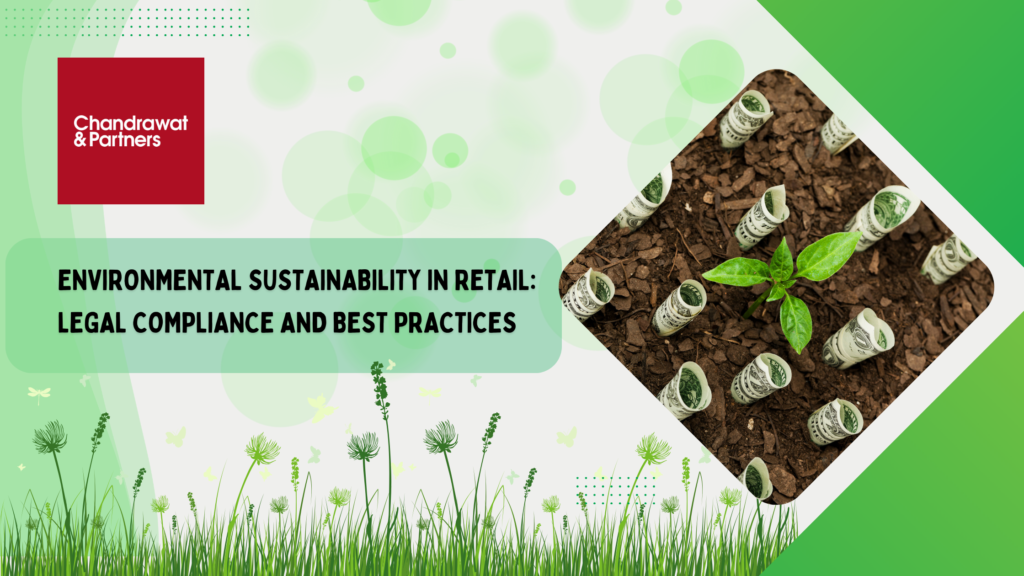Share :
Introduction
In recent years, the retail industry has witnessed a paradigm shift towards environmental sustainability. As consumers become more environmentally conscious, retailers are recognizing the need to integrate sustainable practices into their operations. This blog explores the legal landscape and best practices surrounding environmental sustainability in retail, shedding light on the critical balance between legal compliance and responsible business practices.
Legal Compliance: Key Considerations
Retailers must comply with a wide range of environmental regulations, including:
- Waste Management and Recycling: Regulations mandate proper waste management and recycling practices, such as the separation of recyclable materials and the use of certified recycling facilities.
- Energy Efficiency and Emissions Reduction: Regulations aim to reduce energy consumption and greenhouse gas emissions, encouraging retailers to invest in renewable energy sources and implement energy-saving technologies.
- Product Packaging and Labeling Requirements: Regulations govern the use of packaging materials, requiring retailers to minimize packaging waste and clearly label products with environmental information.
- Responsible Sourcing and Ethical Supply Chains: Retailers are increasingly held responsible for their supply chains, ensuring ethical labor practices and sustainable sourcing of raw materials.
- Environmental Reporting and Disclosure: Regulations require companies to disclose their environmental performance, providing transparency and accountability.
Specific examples of environmental regulations include:
- EU Green Deal: Aims to achieve carbon neutrality by 2050 and includes regulations on emissions reduction, waste management, and product sustainability.
- California Circular Economy Act: Requires manufacturers to design products for disassembly and reuse, and to implement take-back programs for used products.
Non-compliance with environmental regulations can result in significant penalties, including fines, lawsuits, and reputational damage.
Best Practices for Environmental Sustainability
There are numerous best practices retailers can adopt to minimize their environmental impact, including:
- Energy Efficiency:
- Utilize energy-efficient LED lighting and HVAC systems.
- Invest in renewable energy sources, such as solar panels and wind turbines.
- Implement energy-saving measures, such as smart thermostats and motion-sensor lighting.
- solar panels on a retail store roof
2. Waste Reduction:
- Minimize packaging waste by using recyclable and reusable materials.
- Implement waste reduction programs, such as in-store recycling and composting initiatives.
- Partner with waste management companies to ensure proper disposal of waste.
3. Sustainable Sourcing:
- Source products from certified sustainable suppliers.
- Prioritize ethically sourced materials and products.
- Reduce reliance on virgin materials and explore recycled or upcycled content.
4. Sustainable Packaging:
- Use minimal packaging and choose recyclable or biodegradable materials.
- Explore reusable packaging options, such as tote bags and refillable containers.
- Clearly label packaging with environmental information.
5. Transportation Optimization:
- Plan efficient delivery routes to reduce emissions.
- Utilize fuel-efficient vehicles and explore alternative modes of transport, such as electric vehicles and bicycles.
6. Circular Economy:
- Implement take-back programs for used products.
- Offer repair and refurbishment services.
- Explore resale opportunities for used products.
Benefits of Environmental Sustainability
Adopting sustainable practices offers numerous benefits for retailers, including:
- Reduced Environmental Impact: Minimizing resource consumption, waste generation, and greenhouse gas emissions.
- Improved Brand Reputation and Customer Loyalty: Consumers are increasingly attracted to brands committed to sustainability.
- Increased Operational Efficiency and Cost Savings: Implementing sustainable practices can lead to reduced energy and waste disposal costs.
- Enhanced Compliance with Legal Requirements: Proactive adoption of sustainable practices helps avoid legal penalties and compliance issues.
- Competitive Advantage in the Market: Sustainability is becoming a key differentiator in the retail industry.
Case Studies
- Patagonia: A leading outdoor apparel company committed to environmental activism and sustainability practices throughout its supply chain.
- Unilever: A multinational consumer goods company with ambitious sustainability goals, including carbon neutrality by 2030.
- The Body Shop: A beauty brand dedicated to ethical sourcing, sustainable packaging, and environmental activism.
Conclusion
Environmental sustainability is no longer optional for retailers. Embracing legal compliance and implementing best practices is crucial to minimizing environmental impact, building brand reputation, and ensuring long-term success. Retailers are committed to a continuous environmental sustainability journey that necessitates a careful balancing act between regulatory compliance and proactive best practices. Retailers must now embrace sustainability as a fundamental aspect of ethical business practices, rather than seeing it as only a duty. Adopting sustainability protects against legal hazards and has a good influence on the environment, which resonates with a sophisticated customer base that appreciates ethical and eco-conscious options as the retail business continues to grow. Retailers have the ability to impact not just their financial performance but also the overall health of the planet we all live on by integrating environmental stewardship into every aspect of their business operations.
For more information or queries, please email us at
enquiries@chandrawatpartners.com





